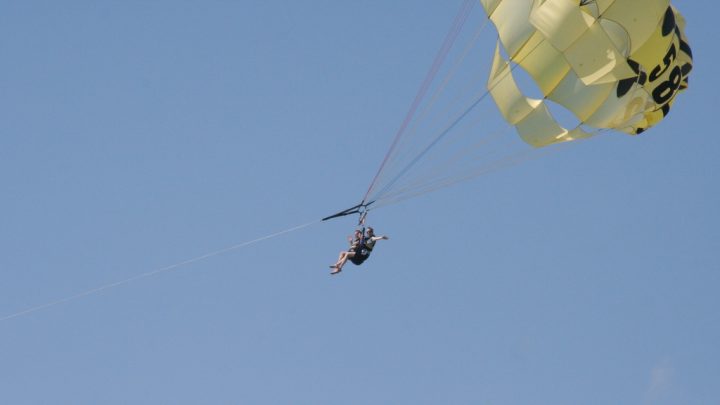Calculating Risks While Balancing Family Life and ALS

Kristin parasailing over Sarasota Bay, FL, April 2010 (Courtesy of Todd Neva)
I went parasailing during a vacation in Florida 10 years ago. I talked my brother into going with me, because my husband, Todd, wasn’t feeling up to it at the time. He had a weak left arm, but we didn’t know then that he had ALS. Todd watched from a park under the John Ringling Causeway with our two children.
My brother and I went out onto Sarasota Bay on a yellow speedboat. The crew strapped us into a tandem harness and unfurled a parachute behind the boat. We stood on the stern, and the driver accelerated, lifting us into the air. From our elevated position, I could see the tops of high-rise apartments on the shore. The driver slowed the boat to dip our legs in the water, and then he took off again, and we floated back into the sky.
After the crew reeled us in and we were safely back in the boat, my brother said, “I’m surprised you wanted to do that. Parasailing can be dangerous.”
I hadn’t seriously considered the risks. The company was professional, and though there was a slim chance that something could go wrong, I had Todd as backup.
I’m much more risk-averse now that Todd has ALS and depends on me to take care of him. Household responsibilities fall on my shoulders, along with the joy of running our kids to school and activities.
I don’t have time to be out of commission.
I’ve recently agonized over the decision to have a grape-sized lump removed from the back of my neck. It’s probably a benign lipoma, but it’s uncomfortable and continues to grow.
What if something goes wrong? I don’t even want to think about my children losing both parents. Should I wait until the kids graduate from high school? Or maybe college?
I told myself that it’s more dangerous to drive, which I do every day. Every surgery carries a risk, but this is a small outpatient procedure. I’ll likely need help for a few days while the stitches on the back of my neck heal. I’ll be unable to get Todd out of bed in the morning or help him onto the toilet.
After months of deliberation and with Todd’s encouragement, I’ve decided to have it removed.
Before scheduling the procedure, I made sure I had people lined up and willing to help.
My mom will bring me home from the hospital, and my cousin will pick up the kids from school and run them to their activities. A retired nurse will wash Todd in the morning and change his clothes. She will get him out of bed, feed him breakfast, and help him onto the toilet. If his lungs fill with fluid, she’ll do an assisted cough.
I’m still nervous. I hope that I will back on duty after a few days.
Since Todd’s diagnosis, I’m more aware of the fragility of life and the potential for things to go wrong. I calculate risk by assuming greater probability that something bad will happen and, if it does, I expect a worse outcome.
A cold is life-threatening, so we have a policy that friends and family who are sick must stay away from Todd. We tell his caregivers to cancel if they have a sniffle or sore throat.
We check that our kids’ friends are healthy before they get together. When our kids are sick, we quarantine Todd in his office until the bug passes.
At the gym, I wipe down the equipment before and after I use it. If a grocery store cashier is coughing, I excuse myself and go look for another item to add to my cart before joining a different cashier’s lane.
We are hand-washing fanatics — it’s the first thing we do when we get home.
It’s a balancing act. We don’t want to cloister ourselves in our house, but we can take common-sense precautions to keep Todd alive. We still get out: We go to Michigan Tech Huskies hockey games, dine at restaurants and attend church on Sundays — but I wash my hands after the greetings.
Life is risky, and Todd’s health is more precarious than most, but we need to keep living.
***
Note: ALS News Today is strictly a news and information website about the disease. It does not provide medical advice, diagnosis, or treatment. This content is not intended to be a substitute for professional medical advice, diagnosis, or treatment. Always seek the advice of your physician or other qualified health provider with any questions you may have regarding a medical condition. Never disregard professional medical advice or delay in seeking it because of something you have read on this website. The opinions expressed in this column are not those of ALS News Today or its parent company, Bionews Services, and are intended to spark discussion about issues pertaining to ALS.







Jeanne
Being the sole caretaker for my husband, I completely understand what you are saying. Last night fixing dinner, I burned my right hand bad enough that it blistered. Taking care of him for the next couple of days will be difficult. A definite fear of caregivers is getting sick, getting injured..even just having an off day makes life difficult. Plus I am an older caretaker..71..which makes things harder physically. I know I don't have the energy I did when I was raising kids and working. Somehow, though, we all get through it.